The Checker Maven
The World's Most Widely Read Checkers and Draughts Publication
Bob Newell, Editor-in-Chief
Published every Saturday morning in Honolulu, Hawai`i
Noticing missing images? An explanation is here.
17th Anniversary

Today marks the 17th anniversary for The Checker Maven. We celebrate 17 years of no-fail on-time weekly publication, something we once would have never thought possible. We reach thousands of checker fans and bring them a consistent message that checkers is challenging, fun, and as relevant today as it ever was.
Our success wouldn't have been possible without the support of our loyal readers, and we can't thank you enough. We once thought to stop publication after 10 years, and then 15, but your encouragement and support has led us to continue on. We can't say how long we'll continue as health and age are increasingly a factor, so let's just say that we look forward to providing more quality checker entertainment in the years to come.![]()
State of the Art

Shown above is what's said to be a "state of the art" kitchen. At least, that's what it was ten years ago. But things move ahead. Ten years is a long time. A lot can change.
In recent times, there have been some significant developments in the field of computer checker engines. Machine learning arrived in KingsRow and later in Cake. That was a huge accomplishment, but it wasn't quite the last chapter of the story.
When today's latest computer engines didn't solve Brian Hinkle's "Prize Problem" world class checker programmers Ed Gilbert and Martin Fierz both looked into the issue. Their conclusions were similar and reasonable. Computer engines are set up for maximum strength during practical play, not for solving highly unusual problems.
But of course Ed and Martin didn't stop there. Ed created a selectable "solver mode" for KingsRow while Martin made some changes to the search function in the Cake engine. The Prize Problem was now solvable. (These new program versions have yet to see public release at the time this article was written.)
But Brian didn't stop his work, either, and went on to create a series of more and more unusual problems which took longer and longer for computers to solve..
So what was the outcome? There may always be problems which it simply isn't practical to program computers to solve in any reasonable amount of time. But the state of the art for checker engines has definitely advanced with the intriguing new work done by both Ed and Martin.
Here's one that Brian sent to Ed and Martin. We warn you, it's not easy.
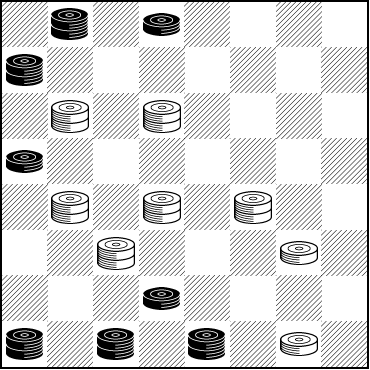
WHITE
White to Play and Win
W:WK9,K10,K17,K18,K19,K22,24,32:BK1,2,K5,13,26,K29,K30,K31
Do attempt a solution on your own before clicking on Read More to see how it's done. These problems are a great deal of fun and definitely test your thinking. Best of luck!![]()
Marvin's Thanksgiving
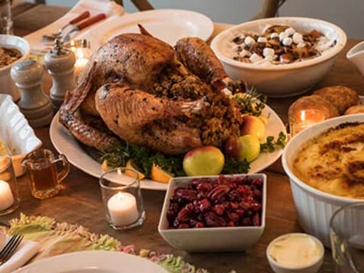
It's Thanksgiving weekend, and Thanksgiving has long been our favorite holiday. It's a great day to reflect upon the many things we have to be thankful for. Yes, we've lived in difficult times, but we can give thanks for lifesaving vaccines, for caregivers and first responders who give their all, and for so much more.
Usually we present a problem from a great American composer. Today we have one from a prolific composer of yesteryear, Bert Berry. It's all part of a story about our iconic character, Marvin J. Mavin, and how he spent his Thanksgiving.

Marvin J. Mavin
Marvin J. Mavin, the superstar captain of the Detroit Doublejumpers of the National Checker League, had to make a decision. But there was little question about what decision he was going to make.
In our previous story, Marvin embarrassed himself and his team by violating protocol during a showcase match in Japan. He was fined $10,000 by his Coach, another $10,000 by the League, and in lieu of suspension was sent to the Doublejumper's Rookie League Farm Team in Bayonne, New Jersey, where he was made to spend a month waiting things out as a substitute player.
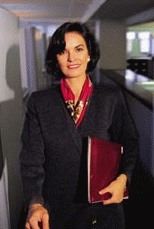
Priscilla Snelson
But worst of all was the trouble he had gotten into with his long-time girlfriend, business executive Priscilla Snelson. Priscilla wouldn't even talk to Marvin for two weeks, and when she finally did, Marvin wished she hadn't.
In any event, Thanksgiving was coming up. Marvin generally spent that holiday with his parents in Berkeley, California. Sometimes Priscilla joined him, sometimes he went alone. But this year Priscilla asked Marvin to join her with her own parents in Grosse Pointe, Michigan. Except she didn't exactly ask, and Marvin was hardly in a position to bargain or plead.
Hence, Marvin's decision as to what to do about Thanksgiving was pretty much a done deal.
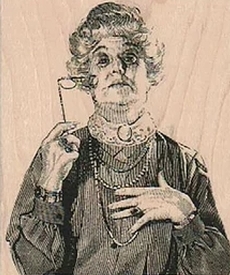
Mrs. Hermione Snelson
The trouble was, Marvin didn't get along with Priscilla's parents. Or rather, they didn't get along with him. It wasn't very good with Priscilla's mother, Mrs. Hermione Snelson. But it was much worse with Prisilla's father, Mr. Winston Snelson, who was a partner at the Detroit law firm Snelson, Nelson, Kelson, and Delson, a high-end outfit whose rates started at $3,000 per hour for junior staff and rose to $10,000 per hour for partners. Mr. Snelson also thought himself to be rather good at checkers, and in fact had played while at law school years ago, but went on to a law career when he didn't get selected for a pro team in the amateur draft. He continued to play to this very day in the Metro Detroit Super Suers League, a rather strong amateur organization for players at law firms.
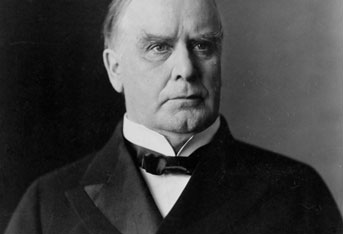
Mr. Winston Snelson
Priscilla's parents lived on a large estate in Grosse Pointe, in a home with 10 bedrooms, 14 baths, a 10 car garage, a horse stable, two guest houses, and around a dozen full-time staff.
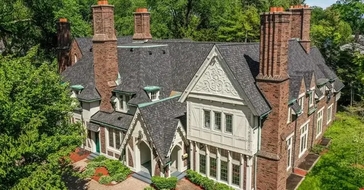
On Thanksgiving Day, Winston sent one of his Rolls-Royce limos to pick up Priscilla and Marvin. As usual, Marvin was running behind schedule and Priscilla, waiting in the car, was getting more frustrated by the minute. Finally, Marvin strolled out of the entrance of his apartment building.
"Will you hurry up, Marvin?" Priscilla called through the open car window. "You know how my father hates us to be late."
The look on Priscilla's face told Marvin enough, and he hustled over to the car and quickly got in. "Okay, Prissy, okay, we'll be pretty close ..."
"Don't call me Prissy! And no, we're going to be fifteen minutes late!"
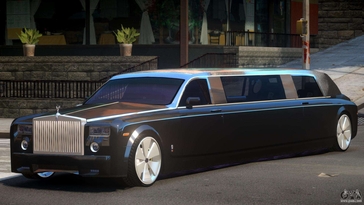
The car sped along but there was some traffic and didn't pull up to the front of the Snelson mansion until 4:30, a full half an hour late.
Mrs. Snelson met the couple at the huge, ornate door, held open by two liveried footmen. She gave Priscilla a hug and Marvin a cold stare. "Don't make excuses," she snapped at him. "You've made Priscilla late and my husband is very angry."
"Aw, gee, Mrs. Snelson, it ain't that late ..."
A nudge from Priscilla was all it took to stop Marvin from saying anything further.
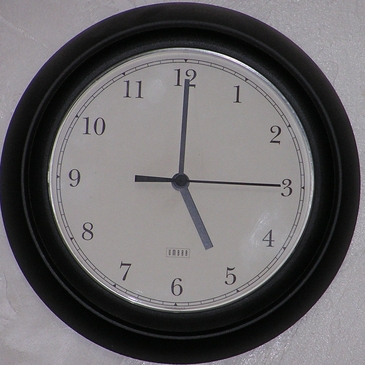
"Dinner will be at five o'clock precisely," Mrs. Snelson said. "That will just leave you time to ... clean up." She eyed Marvin from head to foot. "If that's possible."
"However," she continued, "you have missed the cocktail hour so you will have to go without drinks. You may have some wine at dinner, but that will be all."
"No beer ... ?"
Priscilla gave Marvin another nudge, this time a little harder. "Please, Marvin," she said, "keep the peace and go wash up a little. For me, okay?"
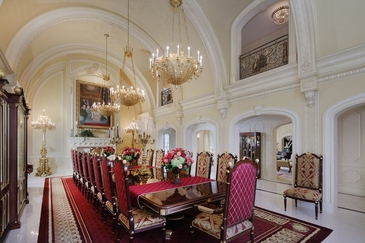
Half an hour later, Marvin, Priscilla, and Mr. and Mrs. Snelson gathered in the mansion's huge formal dining room. Winston merely nodded at Marvin and didn't offer to shake hands.
"At least your dad didn't chew me out this time," Marvin whispered to Prisilla.
"What did you say, young man?" Mr. Snelson said in a commanding voice. "Speak up so everyone can hear you. We don't have private conversations at our table."
"Uh, nothing, sir, I didn't say nothing," Marvin said sheepishly. "Just, you know, asking where to sit."
"You know very well where to sit, and you may all be seated now."
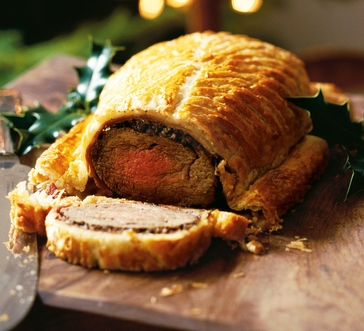
The staff began to serve dinner. There were courses of mock turtle soup, Salade Nicoise, and Dover sole, followed by the main course, Beef Wellington, accompanied by Pommes Anna and a medley of fresh steamed vegetables. Crusty French bread served with Lille butter completed the offerings.
"Ain't we havin' turkey?" Marvin asked. "Thanksgiving, you gotta have turkey. It just ain't American ..."
"I decide the menu at this table, not you," Mrs. Snelson said.
"I told you we should never have invited him," Mr. Snelson said.
"Father," Priscilla said, "please, give Marvin a break. You're awfully hard on him."
Marvin gave Priscilla a look of gratitude but Mr. Snelson went on, "Well, my daughter, if that's how you feel, why don't you insist that this --- person --- marry you instead of leading you on for so many years? Not that I want him for a son-in-law, mind you, when there are so many good men who would wish to court you if you would only let them."
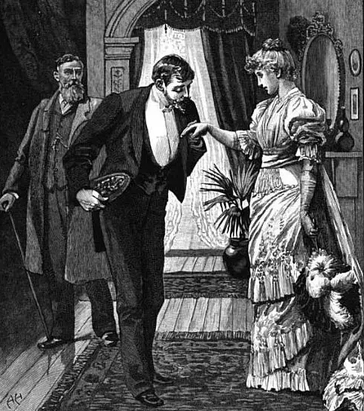
"Hey, Mr. S., I make lotsa money! I ain't so bad ... and Priscilla's my honey." He put his arm around Priscilla's shoulders. She beamed until Mr. Snelson's scowl made Marvin pull his arm quickly away.
"Priscilla has plenty of money in her own right, both from her highly successful career and her family. You may be a checker superstar, and you may get a superstar's wages, but look at you. At heart you're nothing but a bum. When was the last time you took a shower or brushed your teeth?"
"Hey, Mr. S., just because you couldn't make it in the pro ranks don't mean ..."
"Enough of this!" Priscilla's voice was loud and sharp. "Father, Marvin is my intended and you need to accept that gracefully. And Marvin, don't you go throwing gasoline on the fire. Come along, we're leaving now."
"Aw, Prissy, I'm still kinda hungry!"
"Marvin! Now!"
Mr. and Mrs. Snelson were stunned. Priscilla had never been so forceful with them. They said nothing as Priscilla took Marvin's elbow and steered him toward the front door.

They were putting on their winter jackets in silence when Marvin noticed a checkerboard on a side table in the entryway. It had been said up with the following position.
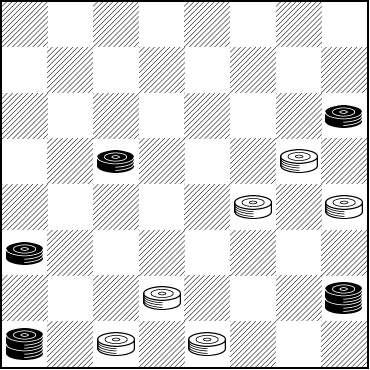
WHITE
White to Play and Win
W:W16,19,20,26,30,31:B12,14,21,K28,K29
"Hey, kinda cool," Marvin said. "Looks like all you need to do is ... hmm ... yeah, maybe not ... oh, how about ..."
"Marvin!"
"Lemme just take a picture, willya? I kinda want to figure this one out ..."
But before Marvin could reach into his pocket for his cell phone, Priscilla had him out the door and on the way to her waiting car and driver.
After they were seated and the car departed, Priscilla said, "We'll stop for turkey at a diner. Just you and I." She smiled. "I think that will be nice, don't you?"
Marvin's only reply was to pull her close and kiss her cheek.
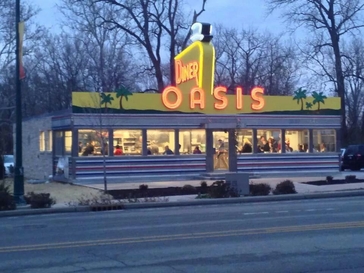
Evidently Mr. Snelson, despite his somewhat supercilious nature, enjoyed a good checker problem, too. A shame that Marvin never got to solve it. Can you? Give it a try; you won't have anyone rushing you out the door. It's some good Thanksgiving fun. When you're ready, click on Read More to see the solution.
[Read More]Problem Composing Contest 59: Compound Strokes

In Chinese calligraphy, characters are formed from basic strokes and compound strokes of the writing instrument. The basic stroke involves one movement of the instrument while the compound stroke involves more than one.
In checkers, there are compound strokes as well. We'll let Mr. Bill Salot explain them as part of Unofficial World Championship Problem Composing Contest #59, which is now active and available on the contest page. Four tantalizing and action-packed problems by some of today's finest and most talented composers await your solving pleasure.
Be sure to vote for the one you think best.
Here's a sample of a compound stroke problem. It was the winner of Contest #44.
Leo Springer
BLACK
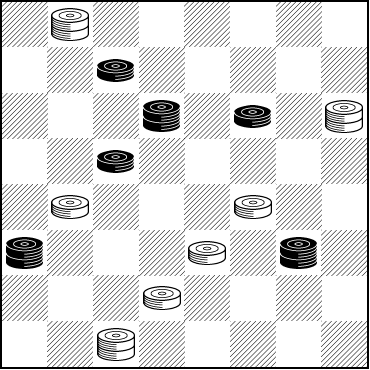
WHITE
White to Play and Win
W:WK1,K12,17,19,23,26,K30:B6,K10,11,14,K21,K24
See if you can sight solve it; lacking that, set it up on your board and try moving the pieces around. But there's no need to compound your frustration; pounding your mouse on Read More will show you the solution.![]()
Beacon Cafe: Among Friends
Thanksgiving was coming soon, and after today, the Coffee and Cake Checker Club would only have one more Saturday afternoon meeting before the 1955 Thanksgiving break.
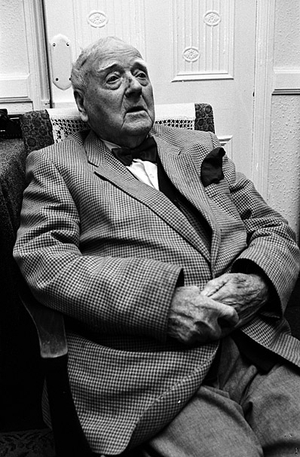
Sal Westerman
That break wasn't very long--- only one Saturday session would be missed, on Thanksgiving weekend--- but Sal Westerman loved his checkers and loved his little club. He had become a sort of minor celebrity around Bismarck, North Dakota after winning the North Dakota State Checker Championship last month, but he didn't care about fame. More important to him was the camaraderie and companionship he shared with the "boys" of the Club (all of whom were over 50).
It was a crisp and clear afternoon with temperatures in the low 30s and a bit of a wind starting to come up. Sal was the first one to arrive at the Beacon Cafe, where the club met.
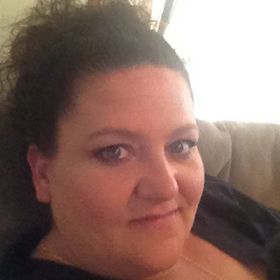
Deana Nagel
"Going back to Gackle for the holiday?" he asked of Deana Nagel, who was the Cafe's proprietess and one of the best bakers anywhere around.
"Yep," Deana replied. "Closing for five days. A little vacation for me." Deana was a hard worker, keeping the Cafe open every day but Sunday and getting up early to make the delicious baked goods that everyone craved.
"What's fresh for today?" Sal said.

"Cranberry muffins," Deana said. "You and the boys are going to have a real treat."
Just then, Wayne, Dan, Tom, and Delmer arrived. "Ron and Larry can't make it today," Wayne said. "I ran into both of them at the hardware store. Ron's got to fix his furnace and Larry has a backed-up kitchen sink."
"Well, there's still the five of us," Sal said, "and I know one of you will be buying those cranberry muffins that Deana has."
"You mean you, don't you?" Dan said with a smile. "We might just beat whatever problem you're going to show us. You might be State Champ but you can still buy us muffins and coffee."
"We shall see!" Sal replied, smiling back. "Take a look at this. It's from Ed in Pennsylvania."

Ed
The boys weren't smiling any longer. Ed, one of Sal's checker pen pals, was a grandmaster problem composer, and his creations were always a challenge.
Sal set up the following position on one of the checkerboards.
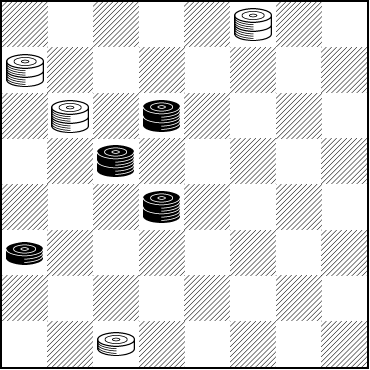
WHITE
White to Play and Win
W:WK3,K5,K9,30:BK10,K14,K18,21
"How about I give you ... oh ... 30 minutes?" he said.
"Aw, Sal, how about an hour?" said Tom.
"45 minutes and not a second more," Sal answered.
With a quick glance at the clock, the boys started to work on the problem.
Cranberry muffins as a pre-Thanksgiving treat, with a hot cup of coffee to go with them? Sounds pretty good. Well, you'll have to supply your own muffins (and coffee) but the problem is there for you to enjoy. Do the best you can and then click on Read More to see the solution and the rest of the story.![]()
Complete Checkers: Insights
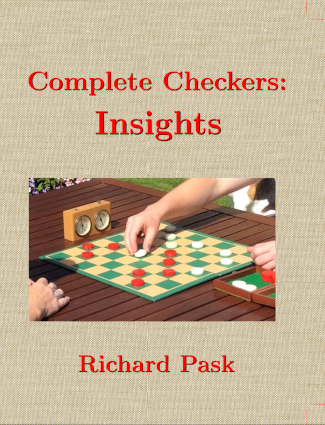
Today marks a milestone in the history of checker publications as we announce the release of Grandmaster Richard Pask's monumental Complete Checkers: Insights.
Insights contains in one volume the newly edited and revised series of five books originally published electronically as the Logical Checkers series. Insights is available as a completely free PDF download or as a modestly priced print book, available from Amazon US as well as other Amazon sites worldwide. The print book is an 8" x 10" trade paperback, 630 pages, double column, with 1,024 diagrams comprising 366 lessons.
Insights provides everything the student needs to go from complete novice to accomplished expert, fully prepared for master level studies. We believe there has never been a checker book like this one in the entire history of the game.
We further contemplate the release of Complete Checkers: Repertoire as a companion volume in the same format at some point in 2022. Repertoire will be an edited reissue of the original Complete Checkers, 3rd Edition.
But for now you can download Insights here, or from the Richard Pask page linked in the right-hand column. Please do consider ordering a print copy if your means and desires so permit, as it will help us to recover the costs of producing this volume.
As always our thanks go out to Grandmaster Pask for his hard work and great generosity.
Here's a position from the book, credited to one H. Byars. Can you solve it? Give it a try and download or buy the book to see the solution.
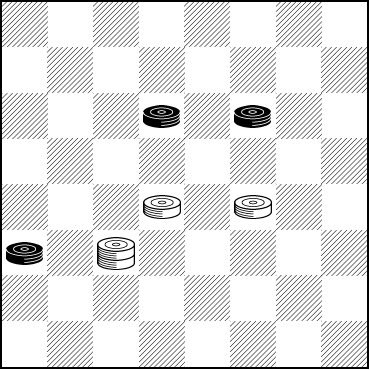
WHITE
White to Play and Win
W:W18,19,K22:B10,11,21
The solution is found under Diagram 872 on page 474.![]()
English Open 2013
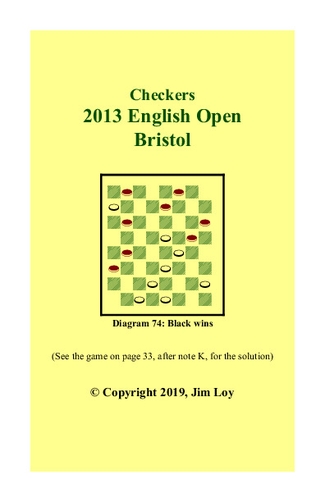
The 2013 English Open 3-Move Championship took place in the city of Bristol from April 22 through April 26 of that year. By any account it was a memorable tournament featuring some fine play. The tournament was won by one of the younger competitors, Shane McCosker. Referred to by Alex Moiseyev as an up and coming player on the world stage, this was hardly Shane's first tournament win. He has taken first place in numerous other tournaments prior to the 2013 contest, including the American Youth Tournament in 2007. He has won many more since 2013.
(The Checker Maven regrets being unable to obtain higher quality photographic images from the Bristol tournament.)
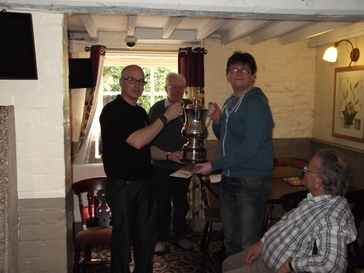
Shane McCosker (right, standing)
Second place went to Francis McNally.
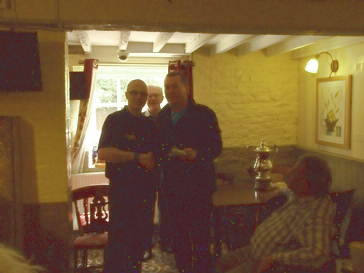
Francis McNally (right, standing)
Third place was taken by Colin Young.
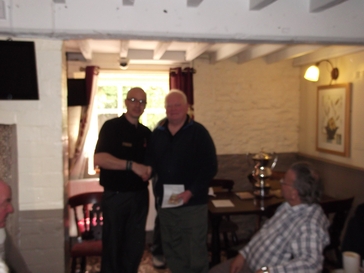
Colin Young (right, standing)
Eminent checker author, analyst, and annotator Jim Loy assembled a book containing a large number of the tournament's games, and added his own notes and analysis as well as many diagrams, set up as problems to be solved. The book is highly instructive, and Mr. Loy is kindly offering it to Checker Maven readers as a free download. It's absolutely worth having and you can get it here.
So how about that problem position shown on the cover of the book?
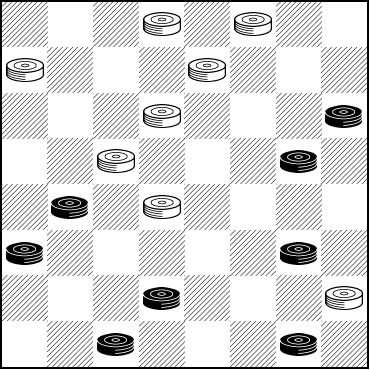
BLACK
Black to Play and Win
B:W5,15,19,23,26,28,30,31:B1,3,7,9,12,16,17,21
See how you do with this one. Of course it's best to download the book, but you can also check your solution by clicking on Read More. Thank you, Jim Loy, for this excellent book.![]()
A Different Prize Problem
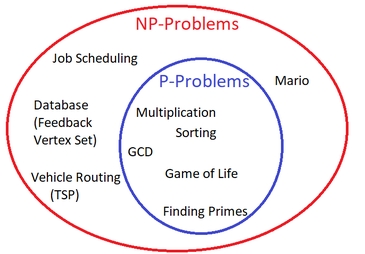
The P=NP problem in computer science is one of the Millennium Prize Problems and if you can solve it, you'll win a cool $1 million prize from the Clay Mathematics Institute. We won't attempt to explain the problem here but it certainly can be said to be at the ultra-difficult level. The prize is yet to be claimed.
Turning to checkers, we recently we presented Brian Hinkle's Prize Problem which carried with it an award of $100 (not $1 million) to the first correct solver. Alas, that reward went unclaimed. Today we have a different sort of prize problem. It was published back in 1907 in the Canadian Checker Player magazine. The prize was a six-month subscription to that excellent publication of bygone days, and the prize was indeed awarded to a successful correspondent.
We'll not claim that the problem is up to Brian's grandmaster composing standards, nor will we offer anything beyond personal satisfaction for finding the solution. But it's nevertheless an interesting composition.
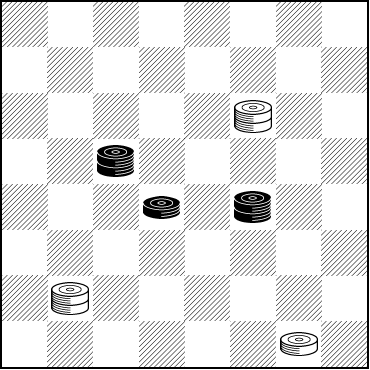
WHITE
White to Play, What Result?
W:WK11,K25,32:BK14,18,K19
Would you have won a half-year subscription to one of history's best checker publications? We'd offer you a free six month on-line subscription to The Checker Maven but that wouldn't be much of a prize given that our publication is already free. So solve it just for the fun of it, and claim a look at the solution by clicking on Read More. If you like, write to us and tell us if you might have been a winner well over a century ago.![]()
In Need of a Spare

Uh-oh. Someone is going to have to get out that spare tire, and no matter how many times you've changed a tire on the road, it's never much fun.
There are other kinds of spares, of course. There is spare time (a rather rare commodity in the Checker Maven offices). You can be "spared" something unpleasant, like a visit to the dentist. A spacious home has "room to spare" --- and so on.
In today's Checker School column, we present a very old position attributed to William Payne. "Spare" also has a meaning in checkers, as you'll see.
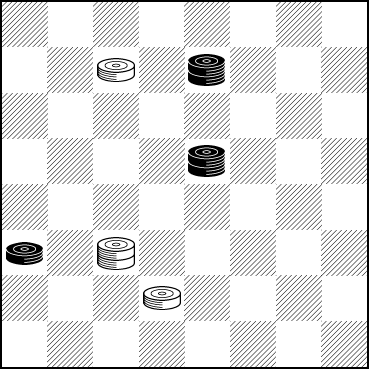
WHITE
White to Play and Win
W:W6,K22,26:BK7,K15,21
Of course, the problem is extremely easy and will be solved in a couple of seconds by players with even a moderate level of experience. But after you solve it, use a spare couple of minutes to click on Read More to see what point Andrew J. Banks, author of Checker Board Strategy, was trying to make.![]()
Beacon Cafe: State Championships
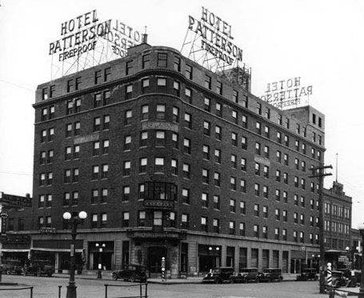
It was the big day. This Saturday, the North Dakota Open would take place with the winner declared the North Dakota State Checker Champion. This year, 1955, the tournament was taking place in the famed Silver Ballroom of the Patterson Hotel in Bismarck.

Sal Westerman
Sal Westerman and the "boys," all of whom were at least 50 years old, wouldn't be meeting at the Beacon Cafe this afternoon, as several of them, including Sal, were competing in the tournament.
The format was simple. The tournament would use the "Swiss" system with three rounds in the morning and two in the afternoon. Players with equal tournament scores would be matched against one another. Play was divided into the Championship Division and the Minor Division.

Gerhardt G. Grossvater
Gerhardt G. Grossvater of Minot was the defending champion and the favorite to win. Other top seeds were Professor Don Steam from Fargo, Danny Dan Daniels from Dickinson, and Bismarck's own Sal Westerman. But there were numerous other strong players and upsets were known to happen.
There was an air of excitement in the ballroom as the early rounds were played. One by one, the lesser players were defeated by the greater. Professor Steam, however, was upset by a player from Beulah, Pawel Patschpawkoski, who was now in the top four along with Danny Dan, Sal, and Gerhardt.
At the lunch break, Sal and a couple of the boys, Delmer and Wayne, went downstairs to the Rainbow Bar for a quick burger.
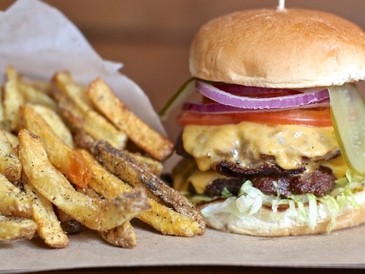
"What do you think your chances are, Sal?" asked Delmer.
"I don't know. I play Danny Dan and I think I have good chances. My record against him is almost all wins. And I don't think this Pawel fellow, good as he must be, can take out Gerhardt. That would leave me to play Gerhardt in the final round, which has never worked out for me."
"Come on, Sal," said Wayne. "You'll do it this time for sure."
But Sal didn't look so confident. The boys finished their lunches and went back upstairs a few minutes before the final rounds were to begin.
Sal was right. He won against Danny Dan, but the game was a close one. Gerhardt easily disposed of Pawel.
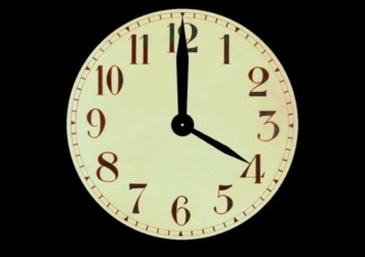
It was four o'clock and time for the final round. Gerhardt and Sal, the only players with a perfect score of four points so far, would once again play for the title.
Gerhardt was certainly polite enough, though he had just a bit of a swagger about him. Perhaps, as many-time State Champion, he felt he had earned it. For his part, Sal looked a little worried. Gerhardt was more than just good. He held his own in national tournaments, let alone in North Dakota.
The game began. Spectators thronged around the playing area. This was the game of the year, the one that would crown the Champion.
Sal gained a little confidence as play went on. Gerhardt, on the other hand, seemed frustrated at not being able to force a quick advantage.

The game took some odd twists and turns. Numerous kings were crowned but still the game stayed close. Finally Sal went a piece up, having four kings and a man to Gerhardt's three kings and a man. Could this be Sal's moment?
But the win, if any, looked tough. Gerhardt, having made a move, looked over at Sal, extended a hand, and said, "Draw?"
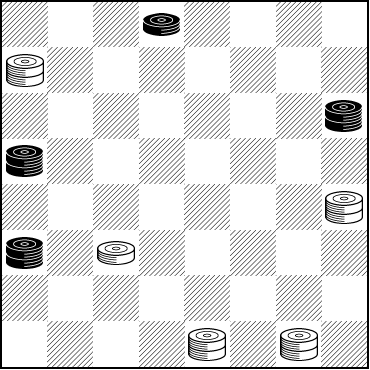
WHITE (Sal)
White to Play and Win
W:WK5,K20,22,K31,K32:B2,K12,K13,K21
Sal was surprised by this. Gerhardt played games to the very end, almost never resigning and seldom even offering a draw unless the position had no play whatsoever left in it. Did this mean, Sal wondered, that Gerhardt might actually be in a loss and was bluffing?
"Thank you, but let's play it out," Sal replied.
"You won't take a draw against the great Gerhardt G. Grossvater, someone against whom who have a lifetime score of zero?" Gerhardt replied.
Now the crowd murmured. Gerhardt was known to have something of an ego, but this was a bit much.
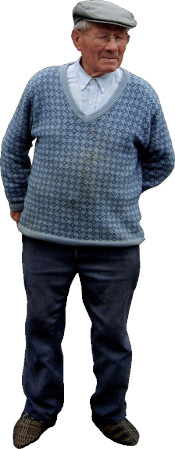
Referee Julian Jaegerlitz
"Quiet on the floor!" Referee Julian Jaegerlitz called out. Sal, for his part, did not reply. He thought for a minute or two, and then simply said, "Here," as he made his move.
Can you win this one? For Sal, his first ever State Championship hangs in the balance, but for our readers, there's no pressure, just the enjoyment of solving a fine problem (it's by Brian Hinkle). See you how do and then click on Read More to see the solution.![]()
The Checker Maven is produced at editorial offices in Honolulu, Hawai`i, as a completely non-commercial public service from which no profit is obtained or sought. Original material is Copyright © 2004-2025 Avi Gobbler Publishing. Other material is public domain, as attributed, or licensed under Creative Commons. Information presented on this site is offered as-is, at no cost, and bears no express or implied warranty as to accuracy or usability. You agree that you use such information entirely at your own risk. No liabilities of any kind under any legal theory whatsoever are accepted. The Checker Maven is dedicated to the memory of Mr. Bob Newell, Sr.

